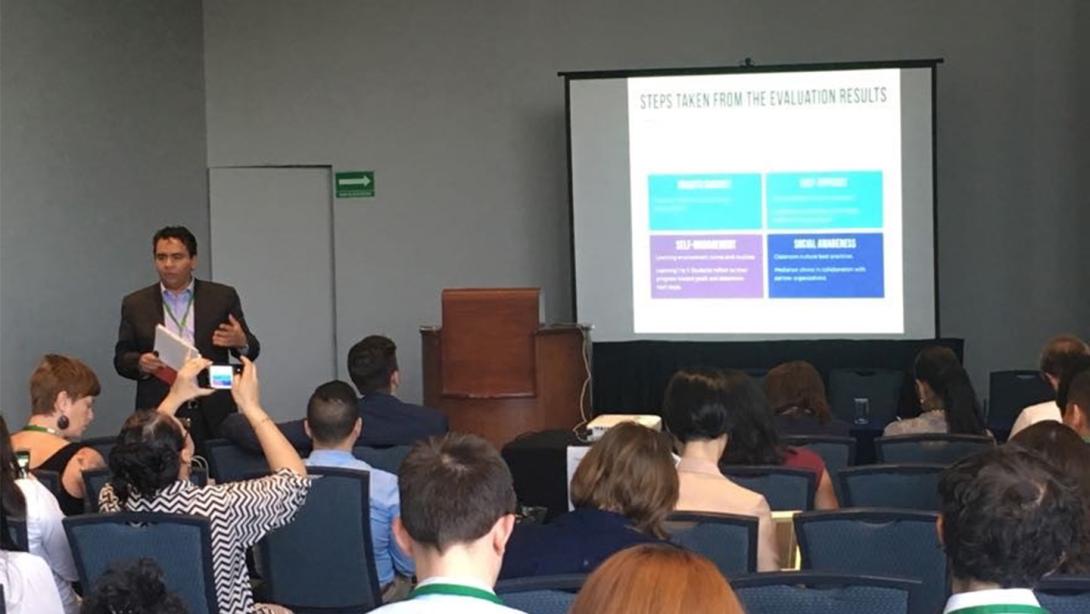Teach For All Participates in Comparative International Education Society’s 2018 Annual Conference

In late March, Teach For All brought together 12 partners from across the network for a Research & Evaluation Network Learning Trip to the Comparative International Education Society’s 2018 Annual Conference (CIES 2018) in Mexico City. The group participated in a series of workshops focused on sharing examples and insights from innovative approaches to research and evaluation in parallel to attending CIES 2018, which gathered stakeholders from the public and private sectors focused on education.
On March 28th, Teach For All kicked off the day with a breakfast session for CIES attendees that highlighted network partners’ focus on putting communities at the center of their work. Aakanksha Gulati, Teach For India - Delhi’s City Director; Rosario Tafur, Enseña Perú’s Chief Program Officer; and Steve Colon, Teach For America’s Vice-President of Organization-Wide Learning & Strategy, shared how their respective organizations are approaching working with the communities in which their participants teach. Nick Canning, Teach For All’s Strategic Advisor, explained how the network has been prioritizing and investing in fostering collective leadership and system change through community engagement.
Later that day, Teach For All participated in three panels that highlighted various partners’ work. Dena Trujillo, Venture Partner - Education at the Omidyar Network, moderated the panel The Impact of Fostering Local Leadership Through Education, which featured Nick Canning alongside Shona Bezanson, Senior Program Manager - Education & Learning from the Mastercard Foundation, and Victoria Haro, a member of Ashoka’s Global Change Leaders in Education and Dean of the Universidad del Medio Ambiente in Mexico. The panel showcased each organization’s leadership development efforts, as well as how they are building evidence of impact. Teach For All shared the results of Global Equity Within Reach, a multi-country series of studies on network alumni mindsets, behaviors, and career trajectories, which have found that participants are more likely to remain working in the education sector (Dobbie and Fryer, 2015) and have a higher agreement about how systemic injustice affects educational and other social outcomes (Mo and Conn, 2017). The studies also demonstrated that participating in a Teach For All network partner’s program influences the educational policy preferences of those teachers and alumni (Claro and Sanchez, NP).
The second panel, entitled Challenges and Innovations in Measuring Student Socioemotional Skills, featured an active discussion of innovations in measuring socioemotional skills from global and local perspectives. The panel was chaired by Rafael de Hoyos, Lead Economist at the World Bank, and featured Erik Ramirez, President & Co-founder of Enseña por México; Armando Chacón, Partner at Microanalitica; and Sofía Frech, who leads the Construye T national program for developing socioemotional skills from the Secretaria de Educacion Pública of Mexico. A focus of the panel was the results of Enseña por Mexico’s pioneering short-term impact evaluation, conducted by Microanalitica, which found that participants have a positive impact on the development of students’ socioemotional skills, such as self-efficacy, self management, growth mindset, and social awareness, in addition to creating positive classroom environments for their students. During the panel, Erik noted that Enseña por México is using these results to orient their training and ongoing support of participants to better develop the socioemotional skills of their students.
Finally, the panel Developing Capacity, Systems, and Tools for Monitoring, Evaluation, and Learning in a Global Network Through Peer to Peer Learning featured a discussion of the network’s approach to building monitoring, evaluation, and learning capacity—including Teach For All’s virtual Research & Evaluation Fellowship for developing, implementing, and promoting right-fit research and evaluation systems across 16 network partner organizations. Emily Pearson, a manager of measurement, evaluation, and research at Teach For Australia, spoke about the importance of generating buy-in across the organization in monitoring, evaluation, and learning (MEL), while Tomas Vergara, Chief Program Officer at Enseña Chile, and Magdalena Fernandez Lemos, Chief Program Officer at Enseña por Argentina, discussed internal and external research projects their organizations are engaging in to build a better understanding of their programs’ efficacy and impact. Nick Canning led partners in discussing how peer-to-peer learning supported their individual MEL work and the panelists noted that learning from each other’s successes and challenges enabled them to make faster progress in developing MEL capacity and systems.
The Research & Evaluation Network Learning Trip to CIES 2018 is among the many examples of the Teach For All network’s ongoing engagement in both internal and external research that examines the impact of partners’ participants and alumni on students and communities, as well as the impact of the global network on accelerating partners’ progress. Learn more about Teach For All’s approach to research and evaluation.



